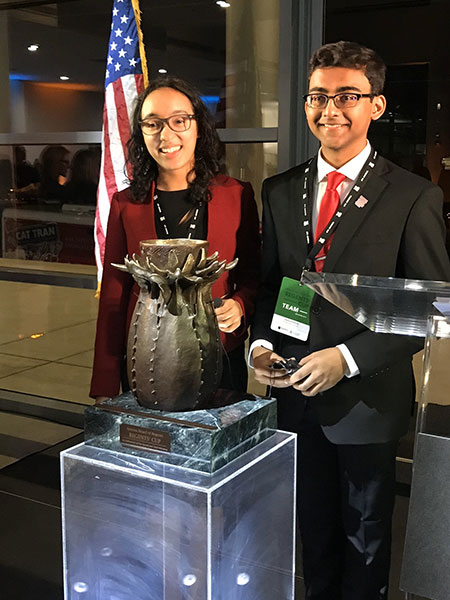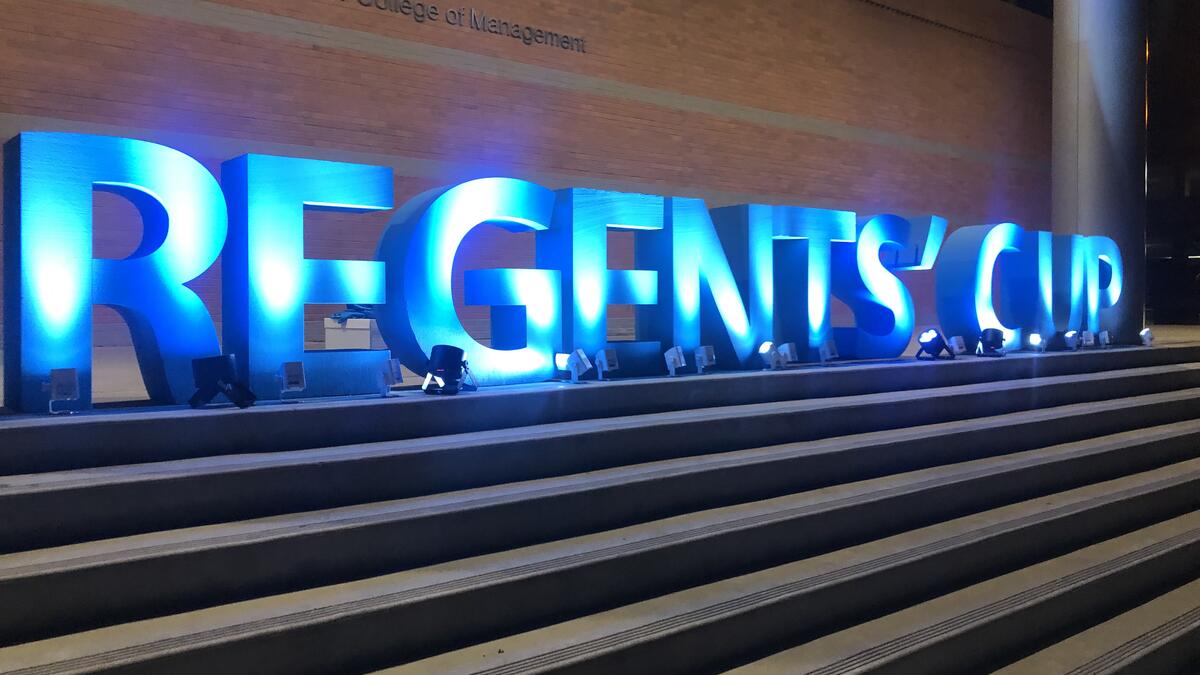Update: ASU won the Regents' Cup competition for the second consecutive time. ASU students Abigail Spencer and Langston Tillman took first place in the Oxford debate portion, and Daniel Gyorffy of the University of Arizona took first place in storytelling, each winning $15,000 in a one-time scholarship. Read more about the results here.
When Karrin Taylor Robson was dropping her son off at high school a few years ago, he made a random comment about free speech.
"He said, 'There’s no opportunity to have a conversation with people unless you are walking a particular politically correct line,’" said Robson, an alumna of Arizona State University.
“So for a high school student to feel that way, I thought, 'We have a problem.'"
That comment inspired Robson to think about the lack of civil discourse in the country, and that led her to propose the Regents' Cup, an intellectual competition aimed at elevating respectful and effective communication. Students from Arizona’s three public universities have been researching and training for months and will participate in the 2021 Regents' Cup, a debate and storytelling event that will be livestreamed April 24.
Robson said that when she was appointed to the Board of Regents in 2017, she discovered that ASU had a “green” rating from the Foundation for Individual Rights in Education, a nonpartisan free-speech organization, for its commitment to free speech, while the University of Arizona and Northern Arizona University did not at that time, although they do now.
“Given that ASU is the largest university in the country, it was a huge opportunity for ASU and the state of Arizona to lead the way and model what civil discourse means, and get to a level of understanding as to why our colleges and universities need to be at the forefront of protecting free speech and encouraging civil discourse,” she said.
The Arizona Board of Regents organizes the Regents' Cup, along with the three universities. Winning students receive scholarship money, and the highest-scoring university wins a bronze trophy.
ASU won the inaugural Regents' Cup, held in November 2019 at the University of Arizona. The 2020 Regents' Cup was postponed due to the pandemic.
Jennifer Dyck Brian, honors faculty fellow at Barrett, The Honors College, has been working with ASU’s student teams since the fall. Each university has four teams of two students each in the Oxford debate category as well as four students competing individually in the persuasive storytelling category.

The winners of the 2019 Regents' Cup were ASU students Valielza O’Keefe and Joshua Pardhe. They are shown with the bronze Regents' Cup trophy, which was made by Rusty Bowers, an artist who is the speaker of the Arizona House of Representatives. The Regents' Cup is inspired by the Territorial Cup, the trophy awarded to the winner of the ASU-University of Arizona football game. Photo courtesy of the Arizona Board of Regents
“The overarching theme of the Regents' Cup is always about free speech and civil discourse. Through a variety of prompts, the students explore the complexities of free speech, the need for civil discourse and the ways in which we can promote democratic engagement,” Brian said.
A subtheme this year is “Race in America,” which students can choose to incorporate into their presentations.
Anusha Natarajan, a sociology and history major, found out about the Regents' Cup through a newsletter for students who are in Barrett, The Honors College. She had participated in Model U.N. in high school and been involved in her town’s youth council.
“I noticed the theme was ‘Race in America,’ and with events over the past year, I thought it would be nice to share my experiences and have a plan for action for my generation,” said Natarajan, who has been rehearsing her 12-minute presentation in the persuasive storytelling category every day.
“It’s about some of the misunderstandings that I’ve had as an Indian American, and my experiences in college and what actions I’ve taken to help educate more people about culture and diversity and how they can be in that effort as well.”
Abigail Spencer, who is on one of the debating teams, has been preparing for several hours a week.
“My partner and I set up a calendar of when we have class and extracurriculars to figure out when we both have time,” she said.
“We spend about five to eight hours a week on one-on-one work sessions and preparing research. We find current events and studies that relate to the topic, and we converse with people who are not in this activity to see what their perspectives are so we are not over-researched.”
Spencer, who is majoring in forensic psychology and Russian language, is on ASU’s speech and debate team and has enjoyed being paired with a teammate who has no debate experience.
“I’ve helped him learn about presentation and public speaking, and he’s teaching me to get out of ‘debate’ mode and really interact,” she said.
“There’s an issue we encounter in debate where we construct things in a ‘debate’ way. That’s not how real life works. It’s not always that one side wins and one side loses. There’s nuance. So my partner helped me to understand better how to have these conversations out of a debate setting.”
Spencer said that participants in the Regents' Cup, as well as typical debate competitions, are assigned which side of a topic to present.
“You don’t go into it thinking, ‘This is my side, and I don’t agree with the other side,’” she said.
“You have to be prepared to fully commit to either side, and it opens this internal mode of analyzing issues. You have to present each side in a way that doesn’t encroach on your personal beliefs, and it helps us to understand how to be more nuanced.
“There are not two sides to every issue. There are infinite sides to every issue.”
Robson sees the Regents' Cup as carrying on the work of Sandra Day O’Connor, the first female justice on the U.S. Supreme Court and namesake of ASU’s law school. In 2009, O’Connor founded the Sandra Day O'Connor Institute, which promotes civil discourse and civic engagement.
“One of the things she taught us is that there are adversaries, but no enemies,” Robson said. “We live in a pluralistic society where people have different opinions, and we need to work through our differences to find common solutions.”
Robson said that one of her most gratifying moments was at the end of the 2019 event.
“A young woman from ASU said she initially signed up to compete with the belief that you should be able to shut down people who have ideas or opinions that are different from you, and by the end of her training and the competition, she came to the complete opposite belief — that it’s more speech we need, not less, to work through our differences.”
The public can livestream the Regents' Cup competition starting at 9 a.m. Saturday.
Top image courtesy of the Arizona Board of Regents
More Law, journalism and politics

How to watch an election
Every election night, adrenaline pumps through newsrooms across the country as journalists take the pulse of democracy. We gathered three veteran reporters — each of them faculty at the Walter…
Law experts, students gather to celebrate ASU Indian Legal Program
Although she's achieved much in Washington, D.C., Mikaela Bledsoe Downes’ education is bringing her closer to her intended destination — returning home to the Winnebago tribe in Nebraska with her…

ASU Law to honor Africa’s first elected female head of state with 2025 O’Connor Justice Prize
Nobel Peace Prize laureate Ellen Johnson Sirleaf, the first democratically elected female head of state in Africa, has been named the 10th recipient of the O’Connor Justice Prize.The award,…
